All About Shango: Learn which day is the right day to be served, how you should serve him, ask him, his offerings, the paths, and what his children are like.
In the Yoruba religion, one of the supreme gods (Olofin) rules over several orishas, or deities, who serve, assist, and maintain contact with the people who maintain their faith.
Among the orishas is the deity Shango, who is one of the best known and is part of the warriors.
Who is Shango?
Shango is the king of the Osha rulership in the Yoruba religion, and is one of the most important deities within this religion.
He is the orisha of thunder, lightning, storms, and fire, and is also associated with justice, virility, and dance. This king was a warrior and sorcerer who became a deity after accidentally destroying his home, his wife, and his children.
In Spiritism?
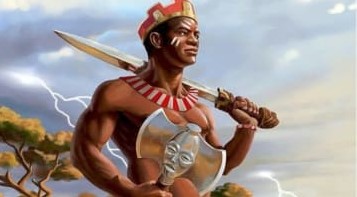
Some time ago, in Spiritism, Shango was sometimes referred to as Shango the King or Shango Nigeria, but treated differently than in Santeria. However, this was gradually lost, and this orisha is now associated with Saint Barbara.
Shango Rey or Shango Nigeria
- No animal or living sacrifices were made to him.
- He was not treated with the necklaces used in Santeria.
- No head washing was performed.
- He was not made a saint.
- He was only invoked for protection.
Saint Barbara
- She is invoked against sudden death and as protection against lightning.
- She is the patron saint of those who work and handle gunpowder and fire.
- She was murdered by her own father for accusing her of being a Christian.
- Both Shango and Saint Barbara are associated with thunder.
- She is offered, prayed for, and served on altars, without any sacrifice.
In Palo Mayombe
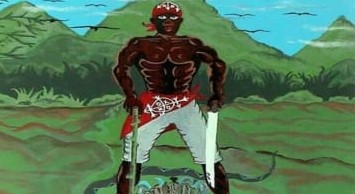
In the Palería religion, Shango is associated with the god known as the Seven Rays, who can also be called Nsambi Munalembe, Nsasi, Mukiamamuilo, or Mariwanga. Their characteristics are very similar:
- He is the god of thunder, fire, and lightning.
- He represents the imperfections and virtues of human beings.
- He represents virile beauty like that of Saint Barbara.
- He is a warrior who was once a king.
- His care requires visits to cemeteries, bones, brains, and sacrifices.
What are the characteristics of this orisha?
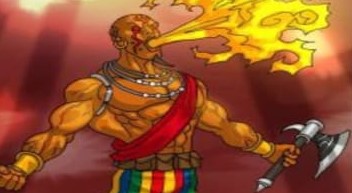
It is quite important that you take the time to learn about the elements and qualities characteristic of each of the orishas, so that you can understand and have a better relationship with them by understanding their roles as deities.
The characteristics of this orisha are as follows:
- He is popularly known as the Lord of Thunder.
- His greeting is “Kao Kabiesilé Shango Alufina.”
- His number is 4.
- Shango’s colors are white and red.
- This deity’s days correspond to Saturday.
- This orisha speaks through Obbara and Ellila Sebora.
- His attributes are the axe, lightning, swords, snails, a crown, drums, a saber, a cup, a mace, and a güira maraca.
- He should be seen wearing a red shirt and white pants.
What is his day?
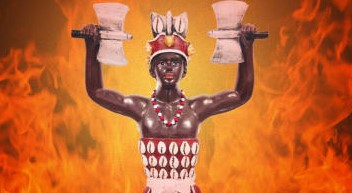
Shango should be attended to on his celebrated day, December 4th, where he should receive attention, offerings, songs, and dances to celebrate his role as a protective and caring deity.
The days of attention are said to be Saturdays; however, many people contradict this by suggesting Friday, just as many claim that the most effective day is Wednesday.
How to care for Shango?
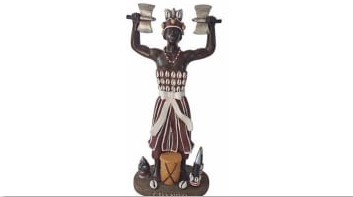
Each orisha must be attended to differently; this will depend on the tastes and demands of each deity. It is important that you comply with their rules and tastes; otherwise, the orisha may take it as a great offense and not listen or attend to your requests.
To attend to the deity of Shango, all you need to do is follow these steps:
- You must attend to him firmly, with great confidence, and with an unwavering will.
- His altar must be prepared, keeping it clean and serene.
- Perform the greeting with respect, addressing him as king, majesty, highness, or something similar.
- Stretch out on the floor.
- Pray with love and faith.
- Place the offerings before him.
- You must stand up when you feel this deity doing so.
Remember to face him when addressing him, since this orisha finds it in bad taste to hide his face or hide from him, so he may become upset.
What do you ask of Shango?
His children turn to this deity whenever they feel unable to face a problem or situation, asking him to fill them with courage and bravery to face the obstacles that arise.
They also ask him for justice and abundance, health, peace, love, strength to defeat their enemies, and above all, they turn to him for protection.
What are his offerings?
As we’ve already mentioned, each of the deities has distinct tastes that differentiate them when it comes to choosing the offerings to make to them. Furthermore, not all of them enjoy certain rituals.
For this reason, if you want to start worshipping this orisha, you should know that the offerings he likes are the following:
- Corn flour accompanied by okra and milk (amalá).
- Indian and green plantains.
- Oti.
- Toasted corn.
- Red wine.
- Birdseed.
- Barley.
If you prefer to sacrifice an animal, these are the following:
- Pigeons.
Turtles.
River turtles.
Ameros.
Guinea fowl.
Roosters and quail. - On the other hand, his ewes for offering are:
- The ceiba tree.
- The paradise tree.
- The camagua tree.
- Flamboyant.
- Mamey.
- Araguey.
- Rue.
- Peony.
- Mahogany.
Where is Shango from?
Before becoming a divine being or orisha, Shango was a legendary king of Oyo, a city located in Nigeria. He was the fourth to receive the crown in his family line, having a wife and children.
This deity is even described by the group called odus obará and ejilaxebora in the dynamics of the merindilogun.
How many paths does he have?
Shango has several paths; however, most are attributed to his title as king of Oyo, his art of lawmaking and warfare, his strength, his relationship with fire and lightning, and his power.
These paths are as follows:
- Shangó Obadimeyi.
- Shangó Obakoso.
- Shangó Bumí.
- Shangó Dibeyi.
- Shangó Alafin or Alafi Alafi.
- Shangó Arirá.
- Shangó Olosé.
- Shangó Kamúkan.
- Shangó Obbará.
- Shangó Yakutá.
- Shango Ko Só.
- Shango Lubbe or Bara Lubbe.
- Shango Olufina Kake.
- Shango Obalube.
- Shango Obaluekun.
- Shango Bangboshe.
- Shango Addima Addima.
- Shango Obbaña.
- Shango Eyee.
- Shango Alayé or Eluwekon.
- Shango Obaya.
- Shango Lubbeo.
- Shango Omangüerille.
- Shango Oban Yoko.
- Shango Alufina.
- Shango Ebbora.
- Shango Ladde or Lari.
- Shango Dedina.
- Shango Luami.
- Shango Deima.
- Shango Deizu.
- Shango Tola.
- Shango Obba Bi.
- Shango Yumi Kasiero.
- Shango Asabeyi.
- Shango Oluoso.
- Shango Okanami. Shango Nipa.
- Shango Gbogbagúnle.
- Shango Gbamí.
- Shango Fáyo.
- Shango Deyí.
- Shango Obanlá.
- Shango Tápa.
- Shango Godo.
- Shango Odúnbadeyí.
- Shango Oba Tolá.
- Shango Oluóso.
- Shango Nupé.
- Shango Oba Yokó.
- Shango Okanami.
- Shango Bolá.
- Shango Oloké.
- Shango Oba Tayo.
What are the characteristics of his children?
Shango’s children are all his believers who pay homage, attend to him, ask for things, and make offerings, to which this deity responds to their prayers. The characteristics of his children are as follows:
- They have the gift of divination and clairvoyance.
- They are not attached to work, but they have a great ability to make money.
- They are brave people with a lot of energy, intelligent, and stubborn.
- They are among the most creative and organized people.
- They tend to be great leaders.
- They have a great sense of humor.
- Their attitude is very kind and affectionate.
- They are destined to achieve success in life without much effort.
- In love, they are very jealous people and never forgive their partner’s infidelity.
- They are ardent and sensual.
- They do not tolerate injustice.
- The women are often gossipy, but very hardworking.
- They love parties, dancing, drinking, and good food.
- They are often prone to fits of anger and can even resort to violent behavior.
- They are particularly adept at police work, firefighting, and the arts, such as music and painting.
- Like Shango, his children are also tenacious, so they are people who will always achieve their goals, counting on the protection and help of the great orisha.
Among many believers or experts in this Yoruba orisha, there is a great debate about whether Shango is good or bad, with many arguing that he is the punisher of enemies. However, this orisha helps with health, well-being, and prosperity.
